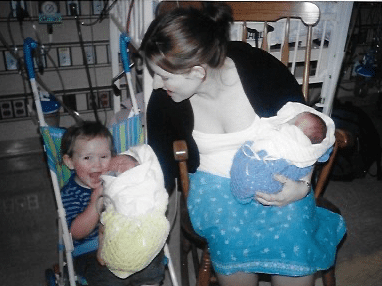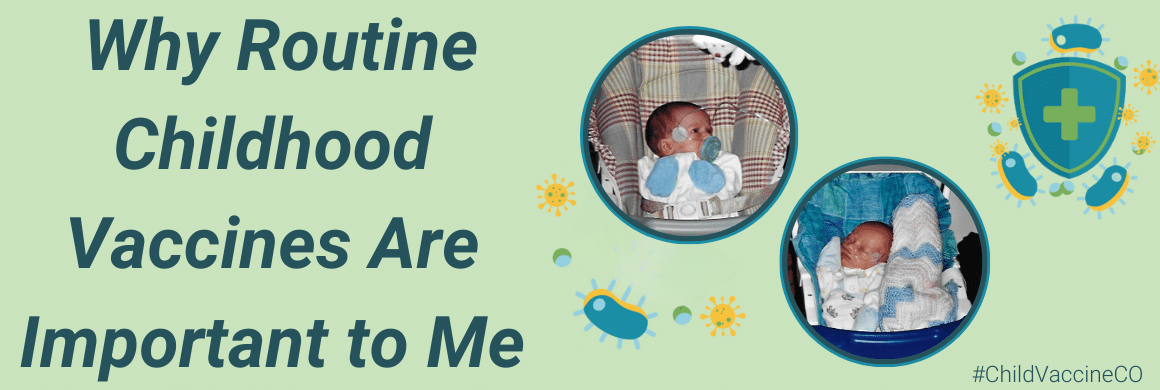Written by Leann Springer, communications manager at Immunize Colorado
In my role as communications manager at Immunize Colorado, I’ve learned a lot about vaccines. Routine childhood vaccines play an essential role in the health of children and our entire community. Diseases once common are now rare – that’s thanks to vaccines! We are lucky to live in a time when our children have access to one of the safest health interventions available. The following is a personal story about why vaccines are important to me and my family.
In 2004, my husband and I were expecting twin boys. While we were elated, we knew twins were going to be a challenge. Adding to the challenge, we had a nearly two-year-old toddler. That winter, I was put on partial bed rest. This is not uncommon. Moms of multiples are at greater risk for pregnancy complications. Things got more serious in April when I attended a routine doctor appointment. He took one look at me and told me, “Do not pass go. Go immediately to the hospital.” I was preeclamptic. The pregnancy had become dangerous for both me and the babies. Having preeclampsia, if untreated, can lead to shock or death. After five days in the hospital, I required an emergency C-section. We were lucky! All of us made it through the pregnancy. (My husband would like for me to state that he too made it through the pregnancy. It was a scary time!) That said, the boys were six weeks premature. They were required to stay in the Neonatal Intensive Care Unit or NICU.

Our stay at the hospital was not a day or two like a typical birth. It was weeks. My parents traveled across the state to help with the care of our oldest son. The three of them went back and forth between our home in rural Garfield County to St. Mary’s Hospital in Grand Junction. As an active toddler, keeping our oldest off the hospital floor was hard. Imagine all the germs! Inevitably, he became ill and was diagnosed with rotavirus just a few days after the twins’ birth. I’ll omit all the gross details, but rotavirus is simply not fun. He was sick, so sick, and had to be monitored for dehydration! Unfortunately, this was nearly two years before the rotavirus vaccine became available. My husband and I also got sick. We had to quarantine for several days to keep both of our boys and every other infant in the NICU safe. Not seeing them during that time was awful! Diseases like rotavirus can be deadly to infants, particularly preterm infants and those born with other health complications that need NICU care.
It was a difficult time even after we recovered from rotavirus and were able to see our boys again. There were a myriad of tubes and cords connected to them. I wanted to start nursing them, but they had to be tube fed. Every drop of specialty formula they ingested mattered profoundly toward their weight gain. Their tiny bodies, head to toe, didn’t even take up the space from the palm of my hand to the end of my forearm. They floated in newborn onesies like oversized t-shirts. They were put on oxygen immediately after their birth, and we became obsessed with their oxygen saturation levels, fearful of any dip.
Eventually, both boys were released from NICU care and sent home where they continued to need supplemental oxygen. Though we were all home together, we weren’t out of the woods. They would remain at greater risk from complications from illnesses for quite some time. It seemed, throughout preschool and elementary school, a common cold would hit them harder and last longer than it would with their peers.
Routine childhood vaccines were crucial in protecting our boys. I lament that the rotavirus vaccine was not available at the time of their birth. I imagine how much easier those early days could have been if our oldest was protected by it. I also know that the routine childhood vaccines they did get helped them become the healthy adults they are today. For infants too young to receive routine vaccines – especially premature infants – vaccines are critical to ensuring their health and ability to thrive!
Immunize Colorado was formed in 1991 in response to alarmingly low vaccination rates across the state. At the time, only about 50% of Colorado’s children were adequately vaccinated. A group of physicians and other concerned individuals came together to strategize how to protect Coloradans from vaccine-preventable diseases and increase vaccine uptake. Much work remains. You can donate or discover other ways to get involved in supporting our commitment to healthy Colorado communities today!

